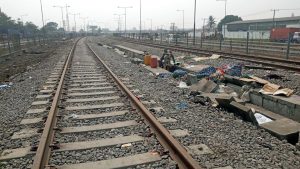Governor Babajide Sanwo-Olu has recently promised that the 18-year-old blue and red light intra-city rail project would be ready before the end of 2022.
The governor had initially promised in 2019 that the blue line project would be completed in 2020 and start operation in 2021. 2021 has come and gone, yet it’s brave a new promise. For how long will Lagosians continue to be played by their governors?

While governor Sanwo-Olu’s new promise is expected to be a beacon of hope for the never-ending project, the question is whether governor Sanwo-Olu’s new promise will be different from those given by former governors Tinubu, Fashola and Ambode.
When the contract was flagged off in 2003, the Lagos light rail project was projected to revolutionise the state’s transport sector and facilitate a modern megacity with infrastructures to support its ever-growing population. The project is expected to connect the mainland with the island, just as the inside to the city’s centre. Such an improved vehicle framework is long expected, yet it is preferable late than never.
It was reported that the rail project has been colour-coded in different phases, which comprise the Blue Line (Mile 2 to Marina); Red Line (Agbado to Marina); Purple Line (Redeem to Ojo); Yellow Line (Otta to Iddo); Brown Line (Mile 12 to Marina); Orange Line (Redeem to Marina) and Green Line (Marina to Lekki).
The project was conceived in 1983 during the Lateef Jankande tenure and was truncated by the Buhari led military regime. It was later reviewed during the Bola Tinubu administration with a formal announcement in 2003. However, till the end of Mr Tinubu’s tenure in 2007, only a little progress was made on the project.
Babatunde Fashola was given the baton after Tinubu, and in 2008, Fashola promised to revive the project and be completed in 2011. The project kicked off in 2009 by the China Civil Engineering Construction Corp (CCECC) at $1.2 billion, while $981 million was borrowed from the World Bank.
However, the 2011 timeline failed then Fashola declared the project would be completed before his tenure ended in 2015, but this wasn’t fulfilled just like the previous promises.
Upon assumption of office in 2015, former Governor Ambode promised to deliver the project in 2016. But again, like his predecessors, Ambode left without completing the Lagos light rail project.
In December 2019, the incumbent governor Babajide Sanwo-Olu promised that the project would be completed in 2020 and become operational in 2021. And now, in 2022, a new promise is here!
Eighteen (18) years down the line, the hope of seeing the project’s coming has continued to wane. At the same time, its execution doesn’t translate to realisation anymore, but rather an attempt to kill further and swindle more public funds.
For up to two decades of unending construction and realisation, Lagosians have continued to experience frustration and disappointment as the project eluded no fewer than four administrations without realisation.
The helpless condition of different areas where the project has been abandoned reflects a significant decay and says a lot about how progressive successive Lagos governors have been since the start of the project.
There are no express reasons from the state government as to why the project is stalling, except the apparent reason and the one given initially, which is the usual paucity of funds.
While many citizens are eager to see the project become operational as soon as possible, some have expressed missed feelings about whether the project will be completed as stated by the governor. With the several other ongoing and uncompleted projects, they doubt if governor Sanwo-Olu will deliver the Lagos light rail project by December 2022.
With the massive resources that have gone into the project and its potentials to meet the transport sector requirements for the state’s ever-growing population, combined with the modern mega city the state aspires, the Lagos Light Rail project is preferable late than never.